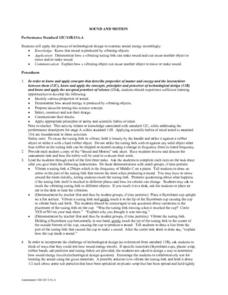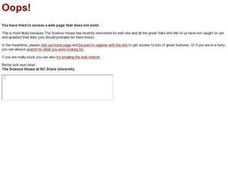Curated OER
Vibrations and Waves
In this vibrations and waves learning exercise, students determine the period and frequency of a pendulum with the mass of .100 kg released. Then they determine whether the amounts increase, decrease, or stay the same when the same...
Curated OER
The Senses
In this senses learning exercise, students describe the difference in sounds heard with a spoon. Then they describe how each object creates a sound and why. Students also explain the process of sound moving through the outer and inner ear.
Curated OER
Importance of the Ear
In this biology worksheet, students identify six important reasons of the ears in humans. They complete a graphic organizer filling in each of 6 circles with one reason of importance.
Curated OER
How the Ear Receives Sound
For this biology worksheet, students identify how the ear receives sound by using the information given to cut and paste each section to complete a flow chart that illustrates this. They lightly color each section of the flow chart to...
Curated OER
What Does Motion Have to do with Sound?
Second graders investigate and explore sound energy. They investigate how the vibrational motion moves through matter in waves. Students describe sounds and vibrations. They observe that vibrational motion creates sounds. Students record...
Curated OER
Noise Underwater
Sixth graders predict with reasoning how a sound will be heard underwater and record and communicate their findings. They listen to the difference in the way noise sounds underwater verses out of water and relate this to how whales and...
Curated OER
Sound And Motion
Students investigate the concept of sound and vibration. They use a tuning fork to make an observation. Students then propose the ideas of different experimental designs to test the concept. The ideas are constructed and then tested.
Curated OER
TE Activity: Pitch and Frequency
Learners experiment with a vibrating ruler and a kazoo to study the different pitches and frequencies they produce. They create both high and low pitch sound waves. They examine how engineers use sound energy when designing electronic...
Curated OER
Sound Vibrations
Students examine how vibrations are responsible for the sounds we hear. Students experience vibrations using several of their senses.
Curated OER
2nd Grade Physical Sciences
Second graders complete activities to measure motion and learn about the Earth's history. For this motion and Earth history lesson, 2nd graders discuss sound and complete a matching sound activity. Students then study the history of...
Curated OER
How Does Sound Behave?
In this sound worksheet, students will brainstorm the cause and effect of sound and how sound behaves in different situations. Students will complete a graphic organizer.
Curated OER
How is Sound Made?
In this sound worksheet, students will fill in the blank of 4 facts based on what sound different objects make. Based on those facts, students will write in a conclusion about how sound is made.
Curated OER
Graphing Sound
Young scholars formulate an understanding of sound as a vibration and draw their graph as carefully as possible on their observation sheet. They also record how they made the sound and and a description of the sound. Finally, students...
Curated OER
Frequency vs. Size
Students identify and interpret sound as a vibration and what period and frequency are. They also divide the various types of objects so that all objects are explored and the procedures are determined by the students.
Finally, students...
Curated OER
Drums and Sound
Through discussion, demonstration, and observation of
performances by drum groups, students discover how vibrations
create sounds. Through exploration students can infer that when drums are struck they make noise due to vibrations.
Curated OER
Sound
Second graders answer the question "What is a sound system?" They investigate sound systems and explain how sound is produced. Students visit the sound museum and at each station they predict how sound is made. They construct a simple...
Curated OER
Vibrations
Sixth graders use rubber bands, textbooks, pencils, rulers and yo-yos to experiment with the concept of vibrations. They observe changes in pitch according to the speed of vibrations and record their observations in a journal.


















